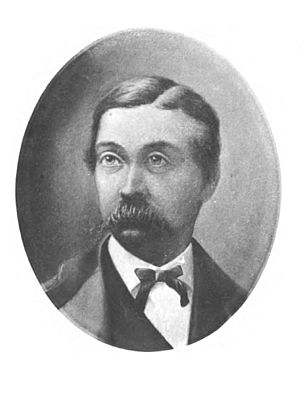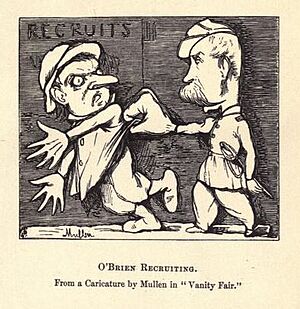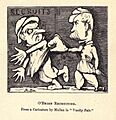Fitz James O'Brien facts for kids
Quick facts for kids
Fitz James O'Brien
|
|
|---|---|

Sketch of Fitz-James O'Brien by William Winter 1881
|
|
| Born | 25 October 1826 Cork, Ireland |
| Died | 6 April 1862 (aged 35) Cumberland, Maryland |
| Occupation | Writer, Poet, Soldier |
| Literary movement | Gothic fiction |
Fitz James O'Brien (also spelled Fitz-James) was an Irish-American writer, poet, and soldier. He was born on October 25, 1826, and passed away on April 6, 1862. He is often seen as one of the first writers of science fiction.
Contents
His Life Story
Fitz James O'Brien was born Michael O'Brien in Cork, Ireland. His family moved to Limerick, Ireland, when he was very young. He later studied at the University of Dublin. After college, he moved to London. There, he spent a large amount of money he had inherited. He also worked as an editor for a magazine that supported the World's Fair in 1851.
Around 1852, he moved to the United States. He changed his name to Fitz James and decided to focus on writing.
Early Writings
Even in college, O'Brien was good at writing poems. Two of his poems, Loch Ine and Irish Castles, were published in a book called The Ballads of Ireland in 1856.
When he first arrived in the United States, he wrote for a newspaper called the Lantern. Later, he wrote for other well-known publications. These included the Home Journal, New York Times, and American Whig Review.
Writing for Magazines
O'Brien became an important writer for Harper's Magazine. Starting in 1853, he wrote more than sixty stories and poems for them. He also wrote for other popular magazines like New York Saturday Press, Putnam's Magazine, Vanity Fair, and Atlantic Monthly.
Famous Stories
Two of his most famous short stories were published in The Atlantic Monthly.
- "The Diamond Lens" (1858): This story is about a scientist who invents a very powerful microscope. Through it, he discovers a tiny, beautiful woman living in a drop of water. This story was a favorite of the famous horror writer H. P. Lovecraft.
- "The Wonder Smith" (1859): This story is an early example of a "robot rebellion" tale. In it, toys come to life because of evil spirits. They then turn against the people who made them.
- "What Was It? A Mystery" (1859): This story is one of the first known examples of invisibility in fiction.
O'Brien also wrote plays for the theater. One of his plays, A Gentleman from Ireland, was very popular for many years.
Life in New York
In New York, O'Brien became friends with many talented writers and artists. He was known for being very entertaining at social gatherings.
A Soldier's End
When the American Civil War began in 1861, O'Brien wanted to join the fight. He joined the 7th regiment of the New York National Guard. He was stationed near Washington, D.C., for a while.
Later, he joined the staff of General Frederick W. Lander. On February 26, 1862, he was badly wounded in a small battle. He suffered for several weeks and sadly died from an infection called tetanus on April 6, 1862, in Cumberland, Maryland.
After his death, his friend William Winter collected O'Brien's poems and stories. He published them in a book called The Poems and Stories of Fitz James O'Brien in 1881.
See also
 In Spanish: Fitz James O'Brien para niños
In Spanish: Fitz James O'Brien para niños
Images for kids
 | Victor J. Glover |
 | Yvonne Cagle |
 | Jeanette Epps |
 | Bernard A. Harris Jr. |




